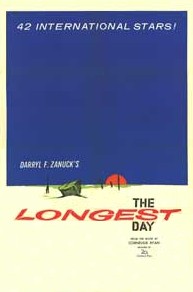
Back أطول يوم (فيلم) Arabic Ən uzun gün (film, 1962) Azerbaijani ان اوزون گون AZB Най-дългият ден Bulgarian The Longest Day Catalan Nejdelší den Czech Den længste dag (film) Danish Der längste Tag German El día más largo (película) Spanish The Longest Day Estonian
This article needs additional citations for verification. (November 2024) |
| The Longest Day | |
|---|---|
 Theatrical release poster | |
| Directed by |
|
| Screenplay by |
|
| Based on | The Longest Day by Cornelius Ryan |
| Produced by | Darryl F. Zanuck |
| Starring | |
| Cinematography | |
| Edited by | Samuel E. Beetley |
| Music by | Maurice Jarre |
Production company | Darryl F. Zanuck Productions |
| Distributed by | 20th Century Fox |
Release dates |
|
Running time | 178 minutes |
| Country | United States |
| Languages |
|
| Budget | $7.75 million[1] |
| Box office | $50.1 million[2] |


The Longest Day is a 1962 American epic historical war drama film based on Cornelius Ryan's 1959 non-fiction book of the same name[3] about the D-Day landings in Normandy on June 6, 1944. The film was produced by Darryl F. Zanuck for 20th Century Fox, and is directed by Ken Annakin (British and French exteriors), Andrew Marton (American exteriors), and Bernhard Wicki (German scenes). The screenplay was written by Ryan, with additional material written by Romain Gary, James Jones, David Pursall and Jack Seddon.
The film features a large international ensemble cast that includes John Wayne, Kenneth More, Richard Todd, Robert Mitchum, Richard Burton, Steve Forrest, Sean Connery, Henry Fonda, Red Buttons, Peter Lawford, Eddie Albert, Jeffrey Hunter, Stuart Whitman, Tom Tryon, Rod Steiger, Leo Genn, Gert Fröbe, Irina Demick, Bourvil, Curd Jürgens, George Segal, Robert Wagner, Paul Anka and Arletty. Many of these actors played roles that were essentially cameo appearances. Several cast members had seen action as servicemen during the war, including Albert, Fonda, Genn, More, Steiger and Todd, the latter having been among the first British officers to land in Normandy in Operation Overlord and participate in the assault on Pegasus Bridge.
The filmmakers employed several actual Allied and Axis D-Day participants as consultants, many of whom had their roles re-enacted in the film. These included Günther Blumentritt (a former German general), James M. Gavin (an American general), Frederick Morgan (Deputy Chief of Staff at SHAEF), John Howard (who led the airborne assault on the Pegasus Bridge), Lord Lovat (who commanded the 1st Special Service Brigade), Philippe Kieffer (who led his men in the assault on Ouistreham), Marie-Pierre Kœnig (who commanded the Free French Forces in the invasion), Max Pemsel (a German general), Werner Pluskat (the major who was the first German officer to see the invasion fleet), Josef "Pips" Priller (the hot-headed pilot) and Lucie Rommel (widow of Field Marshal Erwin Rommel).
The Longest Day premiered in France on September 25, 1962, and in the United States on October 4. It received positive acclaim from critics and was a significant commercial success, becoming the highest-grossing black-and-white movie at the time. At the 35th Academy Awards, the film was nominated for five Oscars, including Best Picture, and won awards for Best Cinematography (Black-and-White) and Best Special Effects.
- ^ Solomon, Aubrey (1989). Twentieth Century Fox: A Corporate and Financial History. The Scarecrow Filmmakers Series. Vol. 20. Lanham, Maryland: Scarecrow Press. p. 253. ISBN 978-0-8108-4244-1.
- ^ "The Longest Day – Box Office Data". The Numbers. 2015. Archived from the original on April 2, 2015. Retrieved April 5, 2015.
- ^ Ryan 1959.